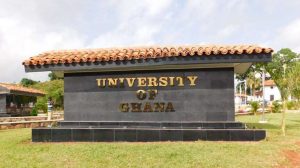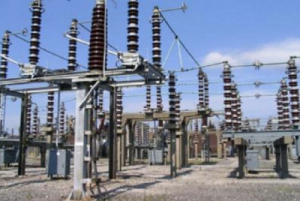The sound of a chainsaw coming to life pierces the quiet of the forest. Illegal loggers are back to work, clearing trees from this protected reserve in Kyebi, a lush, uphill town two hours from Accra, Ghana’s capital city. The Atewa Range Forest Reserve, known as the ‘crown jewel of Ghana’s biodiversity’, has long faced severe threats from loggers and poachers who strip the forest of its unique tree species (the Neolemonniera clitandrifolia, a tree that produces edible fruit and cooking oil, for example) and hunt endangered mammals like pangolins. But this rainforest is currently facing a new danger.
Two years ago, the Ghanaian government struck a deal with mining companies in China, a trade by barter of sorts. To secure a US$19 billion infrastructural loan from the Chinese government, the Chinese state-owned Sinohydro Group was invited to build roads, bridges and rural electrification projects worth US$2 billion. In exchange it has been granted access to Ghana’s bauxite reserves for 15 years, which Atewa and Nyinahin – another forest reserve in the Ashanti region – have in abundance. China has enjoyed diplomatic relationships with Ghana for decades and is currently Ghana’s top trading partner, with US$6.68 billion worth of bilateral trade taking place between the two countries in 2017.
For Ghana, a country of 25 million people – 6.8 million of which live on less than US$1 per day – the loan could prove extremely useful. The country is consistently ranked one of Africa’s fast-growing economies and the China deal could boost the economy even further and create more jobs.
The government has created a state-owned company to help establish an integrated aluminum industry, and between Nyinahin and Atewa, Dr Gideon Baoko, an economic adviser to Ghana’s vice president, estimates that the country could earn about US$460 billion from refined bauxite exports, which is 24 times more than its China debt. Analysts say the real earning potential could actually run into trillions of dollars.
However, the cost to the environment would be devastating.
“We don’t want it,” says 79-year-old Chief Nana Larbikrum, a farmer who heads Larbikrum, a tiny settlement on the fringes of Atewa. The old man has watched informal gold miners and loggers come and go in the area for decades, causing havoc in various pockets of the forest. He and other farmers in the village who rely on the forest’s friendly climate to grow and sell farm produce like cocoa and plantain are especially worried. “They will come and scrape off all the trees, and there won’t be any rainfall or windbreaks for us,” the chief says, wrinkles framing his rheumy eyes.
From the chief’s house, Atewa spreads outwards and upwards, thousands of trees on a sloped horizon rising to meet the clouds. Insects chatter non-stop. In these 23,000 hectares of evergreen land, the last of its kind in Ghana, are some of the most endangered species on the planet. Researchers were astounded to find the Mangabey here. The white-naped monkey, distinctive because of its long limbs and cheek pouches, is on the International Union for Conservation of Nature’sred list of endangered mammals. Some butterfly species, like the Atewa Dotted Butterfly, don’t exist anywhere else in the world.
The forest is also an important source of water for villages like Larbikrum and many other settlements located downstream on the banks of Birim, Ayensu and Densu, major rivers that serve communities as far off as Accra and take their source from the forest. Some 72,000 cocoa farmers living along the banks of these rivers drink and use the water for irrigation. In total, five million people rely on Atewa for water.
“This could be the best tourism site in Ghana”
Since the 1960s, successive governments have eyed the 180 million metric tonnes of bauxite – the main material in aluminum production – tucked beneath the grounds of Atewa. But President Nana Akufo-Addo, who is ironically a son of Kyebi himself, is the only one who has come close to signing off any deals.
The president has made important overtures which suggest that his government wants Ghana’s economy and people to get the maximum benefit from the China deal. At the 2019 edition of the world’s biggest mining investment conference, African Mining Indaba, President Akufo-Addo told investors: “I believe we have come of age. We should not have to give unusual tax and royalties incentives. And mining companies should not expect to make extraordinary profits on our continent,” Reuters reported.
And while there has been no suggestion that President Akufo-Addo will personally profit from the bauxite deal, with presidential elections scheduled for December 2020, many see it as a political move to help bolster his chances of winning a second term in office.
Environmental activists have said “there’s nothing left to fight for” in Nyinahin thanks to years of devastation caused by illegal logging, which is why campaigners are focusing their efforts on forcing the government to exclude Atewa from the deal. “This forest could be the best tourism site in the whole of Ghana,” says Daniel Ewur, a coordinator with A Rocha Ghana, a non-governmental organisation at the forefront of the struggle to save Atewa. The environmental NGO has been lobbying for the forest to be raised to the ranks of a national park in order to generate revenue from ecotourism, instead of mining.
Women in villages like Larbikrum, who double as farmers and traders, say they will be hit the hardest: they are more likely to make money from selling their produce to tourists and acting as local guides than from providing auxiliary labour at a bauxite mine.
Diana Oyelabi, a farmer, points out in Twi (one of Ghana’s major languages): “Who will call on the women to operate machines?” Besides, ecotourism could help women here solve another problem: “We believe that when they come and visit, they will buy our farm produce which gets rotten when it stays here.”
Last July, Resources Minister, John Peter Amewu justified the bauxite deal, saying that the mining could be done “responsibly”. But conservationists disagree, pointing out that mining on such a scale would affect the quality of water, amongst many other things. Environment groups accuse the government of failing to conduct an environmental assessment or engage with stakeholders before signing the deal with China. “I don’t have words to describe how important it is that this place [is left as it is],” says Professor Albert Oteng-Yeboah, a retired professor of environmental biology at the University of Ghana. In light of the urgent discussions taking place globally on climate change, rainforests like these are irreplaceable treasures, he points out.
The price of gold
One evening recently, Ewur took a trip deep into the forest to monitor activities in the area. In the middle of the dense green, about four hectares of land stood out, barren and stripped of vegetation. Two man-made lakes of muddy water sat on it. The site is an abandoned gold mine, owned by Elite Minerals Ghana Limited, one of the many mining companies operating in Ghana, Ewur confirmed. To mine gold, an entire river was diverted, so the miners could then sift through it. And when they were done, they just left. “The damage done when a river is diverted like this takes 400 years to rectify,” says Ewur.
Ghana’s environment has faced threats from gold mining for centuries. The west African country – known as the Gold Coast during the days of European colonialism, because of its rich mineral deposits – is Africa’s second largest producer of gold after South Africa. In 2018 alone, Ghana mined up to US$3.8 billion worth of gold. But many companies, even those properly licensed, mine unsustainably. Mercury and cyanide, chemicals used to mine gold, have polluted lakes and rivers. River Birim, which has the highest gold deposits in this area, and where entire communities drink from, contains mercury levels between seven and 300 times above World Health Organisation standards, depending on the season.
Artisanal small-scale mining or galamsey, as it is known locally, is another issue. Galamsey is widespread in rural communities; according to a 2016 report from the International Institute for Environment and Development, small-scale mining directly employees over one million people in Ghana while indirectly providing a livelihood for 4.5 million more. Government estimates suggest that around half of all small-scale mining conducted in Ghana is done so illegally.
Thousands of undocumented Chinese migrants have also flocked to Ghana to cash in on galamsey, and the scale of their operations has only exacerbated the problem. Where local villagers use basic tools like shovels and pick-axes, the Chinese bring excavators and often, mine on people’s farmlands, causing severe tension between the migrants and local farmers. The government has tried to contain the influx of Chinese workers to Ghana while fighting galamsey: since 2014, a massive crackdown on the sector has sent more than 4,500 undocumented migrants back to China. However, many of the mining firms involved in the practice are owned by Ghanaians, who possess legal rights to mine. In practise, these companies are often run by Chinese bosses, some of which are accused of abusing both their workers and the environment.
“The campaign [to reduce galamsey] has been mostly successful,” says Edmund Adinkra-Darko, a climate change expert with the Ghana Trades Union Congress (GTUC). In 2016, this campaign culminated in a two-year ban on all small-scale mining operations, designed to allow for environmental restoration and a clean-up of the industry. This ban was eventually lifted in December 2018, and while Adinkra-Darko fears that the resumption of artisanal mining could thwart environmental progress, he says from an economic perspective, it is necessary. “People are making livelihoods out of this mining. Some were doing it diligently, others were violating the rules. But we can’t say they should be banned forever.” There should be a roadmap in place however, he warns, to protect the environment. “We expect the government to ensure enforcement of the mining regulations with stiffer sanctions on violators.”
Mining has been killing off Ghana’s forest reserves for years. “Exploitation brings in quick money,” Professor Oteng-Yeboah, who is also from Kyebi, says of the fixation African leaders have with the extractive industry. Ghana has one of the fastest rates of deforestation in west Africa and lost 13 per cent of its forest cover between 2001 and 2017, according to the online forest monitor Global Forest Watch. In 25 years, Ghana could lose all of its forests, scientists warn.
This is why Chief Larbikrum and the other farmers are adamant: the mining must stop. Last year, he joined some members of the community on a trip to Awaso, a village that has already been mined for bauxite. What they saw there was complete devastation. The mining didn’t improve people’s fortunes; if anything, it made them poorer. In a place where land is not only deeply linked to a community’s livelihood but also its wellbeing and heritage, this is a price Chief Larbikrum says he is not willing to pay.
Source: Equal Times






